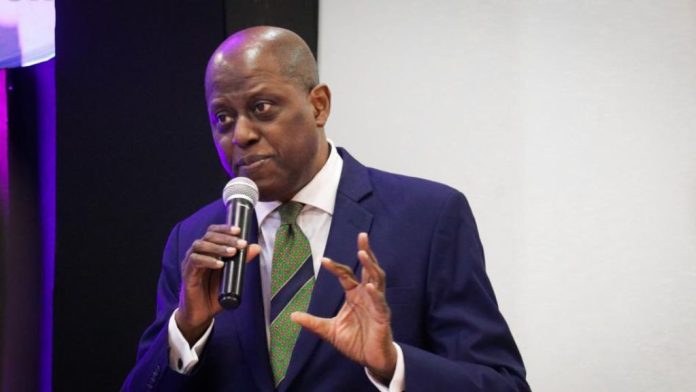685
By Daniel Adaji
The Central Bank of Nigeria (CBN) has tied the prospect of lower lending rates to a continued decline in inflation, saying the Bank’s policy reforms are already restoring stability to the financial system.
Governor Olayemi Cardoso made this clear at the European Business Chamber (Eurocham Nigeria) C-Level Forum in Lagos on Saturday. Speaking during a fireside chat moderated by Andreas Voss, Chief Country Representative of Deutsche Bank Nigeria, he said inflation, though still high, is on a downward trend due to collective efforts.
In a statement on Sunday, he explained that as inflation continues to ease, interest rates are expected to follow suit, creating an environment conducive to corporate lending and long-term investment.
“That is the environment in which stronger corporate lending and higher levels of investment will naturally follow,” Cardoso stated.
The Governor acknowledged concerns about high lending rates but stressed the link between stable prices and sustainable economic growth.
“We will protect the stability that has been re-established in the financial system with the utmost zeal.
“Our primary objective is to maintain that stability while simultaneously addressing inflation and ensuring that the financial system is sufficiently resilient to facilitate corporate lending and investment,” he said.
Cardoso further highlighted the ongoing recapitalisation of Nigerian banks, describing the exercise as “making good progress.” He noted that the policy, which mandates banks to raise their minimum capital, is designed to strengthen financial institutions, enabling them to withstand shocks and finance economic growth.
Beyond recapitalisation, he highlighted the importance of technology-driven solutions, deeper financial inclusion, and support for the fintech ecosystem to fight poverty and broaden access to financial services. He also pointed to growing collaboration between the CBN and key fiscal institutions namely, the Ministry of Finance, Ministry of Trade and Industry, and the Budget Office – as a critical step toward long-term stability.
On Nigeria’s position in the global economy, Cardoso warned that domestic reforms could not wait.
“The urgency of addressing our own affairs is underscored by the ongoing geopolitical changes,” he said. He added that Nigeria’s size and strategic location at the gateway to West Africa made it imperative to maintain stability at home.
Eurocham President Yann Gilbert, in his remarks, praised the CBN’s reforms and reaffirmed European businesses’ commitment to Nigeria.
“Our members are profoundly dedicated to this nation. We aspire to establish enduring partnerships, generate employment opportunities, and invest,” he said.
Meanwhile, on the labour front, the Nigeria Labour Congress (NLC) has renewed calls for a review of the national minimum wage, insisting that the current N70,000 is no longer sustainable amid rising inflation.
Acting General Secretary Benson Upah on Sunday said: “The truth is that N70,000 is not sustainable under the present economic situation. Workers are under immense pressure, and unless the government responds swiftly, the crisis of survival will only worsen.”
President Bola Tinubu signed the National Minimum Wage Bill into law in July 2024, raising the wage from N30,000 to N70,000. However, several states have since gone beyond this threshold—Imo State increased its minimum wage to N104,000, Lagos set N85,000 with a plan to reach N100,000 in 2025, and Rivers, Bayelsa, Niger, Enugu, and Akwa Ibom approved N80,000 and above.



